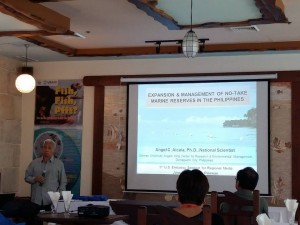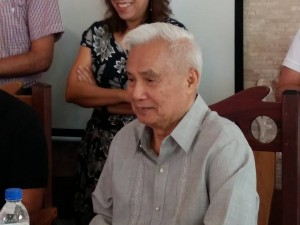Scientist: Reclamation projects to worsen fisheries problems

Dr. Angel Alcala discuss importance of establishing marine protected areas in a seminar held in Coron, Palawan. (CDN PHOTO/ MARIAN Z. CODILLA)
CORON, PALAWAN – National scientist Angel Alcala said reclamation projects would only worsen the decline of fish catch and strain the livelihood of municipal fisher folk.
“Reclamation is generally bad. When you reclaim an area, you convert marine areas into land and it becomes a minus or negative for the marine environment,” he told journalists attending a US Embassy-sponsored seminar on Media for Marine Conservation in Coron, Palawan.
Alcala, a marine biologist, was proclaimed National Scientist of the Philippines in June last year by President Aquino, for his research on marine diversity and marine protected areas.
He was a former Envrionment Secretary and now sits as chairman of the Board of Advisers of Silliman University Angelo King Center for Research and Environmental Management.
He said any reclamation project would reduce fisheries and the potential of reefs.
Overfishing, pollution and destructuctive forms of fishing are among the main causes of The Philippines’ fish catch has been declining.
“Reclamation will change the course of the currents. The result of that is erosion in some parts of the coastal area (near and within the reclaimed area) to somewhere else. And when the direction of the current is changed, it will cause a reduced amount of larvae or juvenile fish being nursed along the coastal area,” Alcala said.
Instead of reclamation projects, Alcala said local governments in coastal areas should unite in establishing marine protected areas.
“The abundance of fish will continue to grow if it is protected. There is a need for marine protected areas to accumulate 100 tons or more of fish from the sanctuary to provide fish stock for the fishers,” he said.
He said the role of the government and local communities in managing sustainable integrated marine protected area is important.
“They have to realize that local government is more effective in protecting the environment than national agencies such as DENR and BFAR,” he said.
Cordova town, Toledo City and Lapu-Lapu City are among the local governments in Cebu that have initaited reclamation projects. Cordova town has the biggest area of mostly seagrass beds and mangrove areas being proposed for reclamation at 1,500 hectares.
Toledo City proposed an 11-hectare reclamation in barangay Poblacion while Lapu-Lapu City proposed a 400-hectare reclamation that will cover the tidal zones of five coastal barangays in the city.

Dr. Angel Alcala
“Cordova’s segrass beds are nursery areas for fish larvae. They go there because they hide from predators in the same manner as mangroves act as areas where larvae and juveniles hide in mangroves so they are called nursery areas. When they grow a little bigger they move out to coral reefs and deep water,” Alcala said.
“If you reclaim sea grass beds, you will reduce the area where fish are nursed and will have an effect on the production of that particular area because you exclude the young ones from being nursed,” he added.
“If the area is polluted, then do something with the pollution. Do not use another scheme (such as reclamation),” he said.
Both the mayors of Cordova and Toledo City said their proposed reclamation project sites are polluted. Converting it into land and developing it will attract investors and provide alternative livelihood to affected fisher folk, they said.
Earlier, Toledo City Mayor John H. Osmeña said he would consult marine biologists of Silliman University on the status of marine life in the proposed reclamation site, which is part of the Tanon Strait Protected Seascape.
The United States Agency International Development (USAID) is funding some projects in the country including projects of Save Philippine Seas in Malapascua, Daanbantayan and Ecofish who has several projects in Visayas and Mindanao.
USAID is also looking into wildlife trafficking in the Philipppines. Cebu was identified as a processing location before finished marine products are being exported.
Joe Foltz, USAID Deputy Chief, OEEC said he met Gov. Hilario Davide III last month on possible interventions to stop the illegal processing of endangered shells from Mindanao and other parts of the Visayas.
“We are looking into Cebu as a marine conservation site. We are talking about enforcement and ways to cooperate the enforcing,” he said.
USAID, according to Foltz coordinated local government units where wildlife trafficking is rampant in the Philippines including Cebu .
He said USAID is also giving technical assistance to the Protected Area and Wildlife Bureau of DENR central office to look into the “controversial” whaleshark watching in Oslob town, south Cebu.
“There are opportunities for how tourism is done there but it is still best to look at the best practices of eco tourism in the Philippines and the world,” Foltz said.
USAID helped set up the whaleshark watching program in Donsol through the World Wildlife Fund.
“The sustainability of that should be looked into in the overall business model. Is what is happening ecologically sustainable? These are the questions we are talking about,” Foltz said.
“We don’t have an outcome in mind yet but this is a local government unit issue. We talk the issue in a holistic way but the decision has to come from the LGU,” he added.
Disclaimer: The comments uploaded on this site do not necessarily represent or reflect the views of management and owner of Cebudailynews. We reserve the right to exclude comments that we deem to be inconsistent with our editorial standards.
